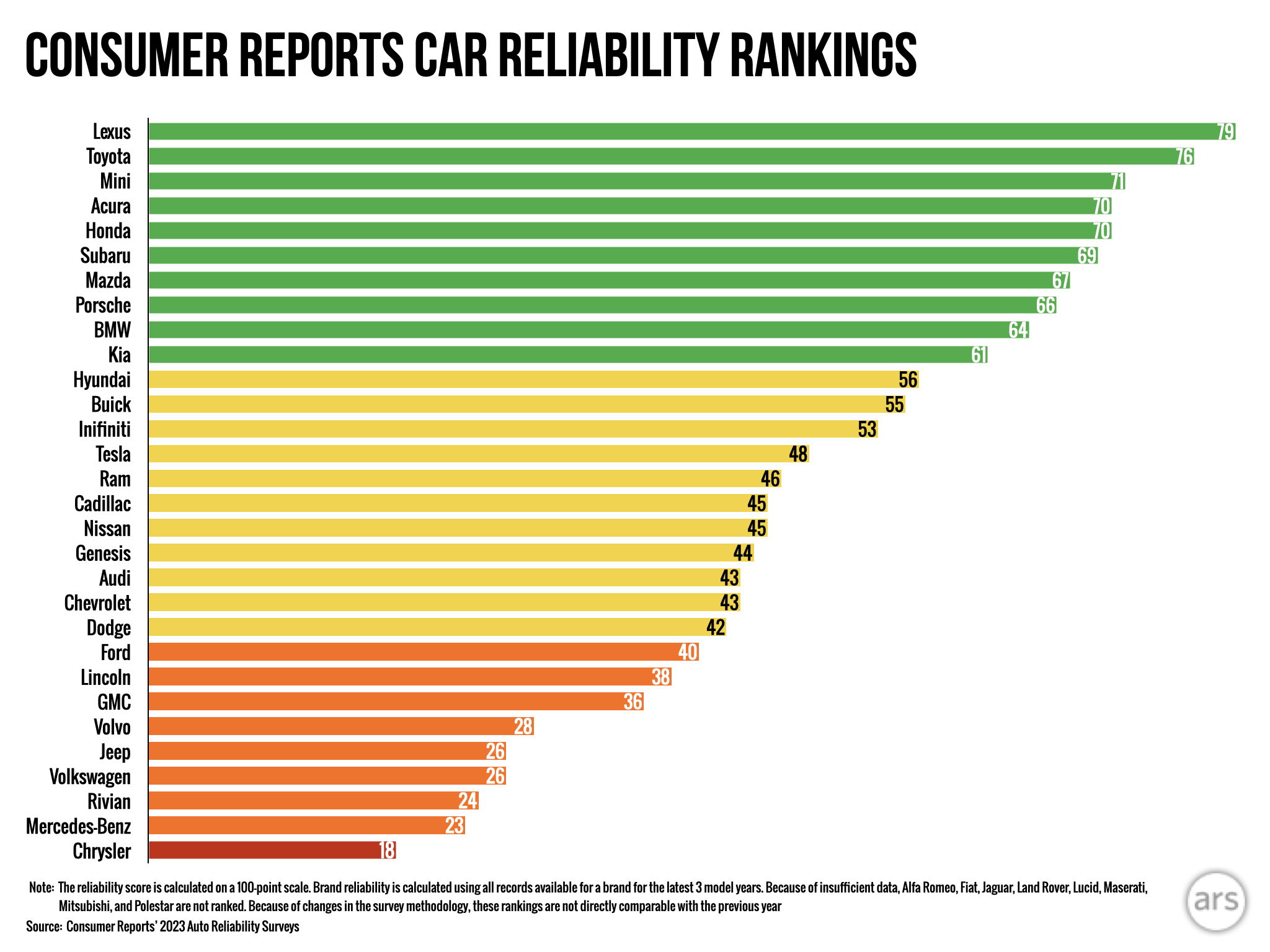It does not help that many new vehicles are built like shit and have complexity for the sake of complexity. Electronic door latches, pop-out door handles, having everything controlled via a clunky, outdated, atrocious GUI, etc etc. These problems are not unique to EV’s but a lot of EV’s are going to have them just because they are brand new vehicles.
I bet if they made an EV without all that crap it would be crazy reliable.
Yeah I’m sad that the rise of EV’s coincides with just how extra cars have become in recent years. If you sold me a mid 90s Honda Civic hatchback with an electric drivetrain, no internet connectivity, no electric door handles or touch screens, I’d be happy with it.
One of my retirement dreams is to build electric remakes of classic cars, complete with authentic exhaust noises
Ford has that crate electric motor that can live in front of a manual transmission
What’s it called?
oh man that would be sick! I hope you achieve your dreams.
If you make the exhaust noises a menu option I can turn off or on, I will buy one.
No, you will get a basic, simple switch. No menus. No touchscreens.
Make it a toggle switch under a cool red cover and I’m in
Yes. I change my request to this.
Make it a three position switch. On, off, and “make the noises with your mouth”
I so want to EV-ify my Honda Element. I’ve never met a vehicle that had it’s same compact/utility/ease of use combination, and Honda ain’t even making them no more…
They should be. They’re orders of magnitude less complex than ICE vehicles as far the driverrain is concerned.
One thing that I always thought as crazy was the amount of electric and electronic shit these modern EVs have. Bitch, weren’t you supposed to save battery for driving? Why are you putting a light show when I’m supposed to be focused on the road?
Eh, something like that probably draws about half a kilowatt, and it would be hard to shed all of that functionality (I think the Mitsubishi i-Miev might, but also reverse cameras are a requirement in cars now so you can’t get rid of the screen)
For comparison, my car has about a 65kwh battery. I probably get maybe 20kilowatts when driving, but there are lots of variables there. If my half-kilowatt estimate is reasonably accurate, you can run it for about 130 hours.
Not to mention much more affordable.
Yeah, it’s fucking dumb having all this shit added that I don’t want and I have to pay for it.
We need a new manufacturer for the common man.
Yes! A true car of the people, almost like a volkswagen!
…wait that’s a car company too? And they’re part of the problem?
Imagine. No software, just a potentiometer regulating how much current goes into the engines.
That’d be one beefy potentiometer capable of handling hundreds of amps of current.
I know it wouldn’t be a potentiometer, as it is extraordinarily inefficient, but you get the idea
Could you imagine taking an old school Square body and making lighter with the very basic modern amenities like power windows and MAYBE a basic touch screen radio. I know aerodynamics and safety are why they aren’t around but find a way to make it work and that stuff would sell to some of the more stubborn people. Like you said strip all the nonsense out and make it basic.
An EV with crank windows, a parking break lever for mad j turns, and a standard double din radio so I can upgrade it like it’s the 9ps again.
Sign me up
No. Same interior but with an electric motor
Dude you could fit a literal ton of batteries into a squarebody. In my 76, the engine bay has enough room to comfortably fit multiple full grown adults inside of it with the V8 engine in place. You could probably fit 3 small block V8s in there without doing anything but removing the inner fenders.
The pop-put door handles thing gets me. Like why do I need to push one end of the handle in, then pull it the rest of the way out on the opposite end? It’s so backwards and convoluted.
Just give me a damn handle I pull out to open the damn door. Why is it so hard?
Flush door handles improve aerodynamics by reducing drag.
That’s true, but also dumb at the same time.
The benefit of reduced drag applies regardless of mode of propulsion.
So really, it’s complexity for complexity sake.
I bet they add all that dumb shit so it breaks and you have to buy a new car after all the bells and whistles are busted and you cant open your doors or trunk, since the motor is so much more reliable and needs less maintenance.
Yeah. I like a nice big touchscreen for infotainment and navigation, but everything else should still be knobs, buttons, and sliders on the dashboard.

As a Subaru driver, nice.
I’m a happy Toyota owner as well.
Just got a 2007 Prius with 150k on it. I’m still getting use to it, but they’re supposed to be reliable. More importantly parts are plentiful and fairly cheap.
I believe that gen engine had an issue with oil consumption due to bad rings, so keep an eye on your oil levels.
I do that anyways!
Same. Owned a Volkswagen previously and seeing the ratings difference makes me glad I changed. I was also affected by the diesel emissions scandal at VW. So, that was fun.
VW requires their mechanics get the least amount of training of any manufacture. I had a VW (pre scandal diesel) and it was very reliable - but only because I did all the work myself. When I took it in I had problems.
It seems to vary from generation to generation with them in terms of reliability. I have a 2017 6th generation golf that has been flawless for reliability so far. Apparently, the surrounding generations were not as good in that department from my understanding.
I also drive a manual and do my own maintenance like you, fwiw. So my experience may be different from the average driver.
My mom had an Audi Q5 (basically a dolled up Volkswagen Toureg) that thing was such a POS. First there was a piston issue that required warranty replacement. Then it started burning oil, and I legit question if they even actually did the piston replacement. It burned a quart every week, but by then, the warranty had expired, so she had to deal with just adding a quart every week. Then it started misfiring, had to change like 5 things out before we got it to stop. She traded it in shortly after, and bought a Toyota instead. I’d been trying to talk her into Toyota when she bought the Audi, but she wanted the fancy German car. Ended up learning the hard way why those things suck. I feel for whoever ended up buying that POS used.
Same here.
Though I wish they were more focused on full EV, rather than the hybrid models (and not even PHEV)
That Toyota 1 year service with warranty is absolutely insane. Will be my next car because of that. £250 for yearly warranty on top of £200+ servicing isn’t great.
I am interested in the differentiation between Ford/Lincoln, GMC/Chevrolet/Cadillac/Buick, and Dodge/Ram/Chrysler, given that each of those groupings is the same manufacturer. And in GM’s case especially they have multiple vehicles under all three marquees that are the same damn car underneath with different badges and trim colors.
Not surprised to see Chrysler at the bottom, though.
What a pile of crap the U.S. auto manufacturers are. They purposefully build cars that break to increase revenue.
It is wrong to see that as a “US car manufacturers” problem. That mistakenly implies that other corporations would not behave this way or that this is anomalous behavior. This is how monopolies behave and it is the end state of any insufficiently regulated market.
Probably down to factory quality control and parts sourcing. Sure most of the parts are coming out of China. But, companies can get better or worse quality parts for more or less money. And once those parts are put in a car, you can have differing levels (read: costs) of the work being double checked.
Clearly, all those brand new Mercedes-Benz drivers are regretting not opting for the used 2008 Hyundai Santa Fe they could have had. Live and learn…
I’ve been in a few newer A class vehicles. My god. It’s like being the the back of a fiat panda ride quality wise. The amount of issues about the screens dying (Speedo, oil, everything and MOT failure) on 2 year old cars costing £700+ for whole unit replacements is insane.
Expect Hyundai/Kia trend downward for the coming years as the used market gets filled with Theta engines. Bummer since the Gamma was solid.
How’s the Kappa? Asking because I have an Ioniq Hybrid
No clue.
I have a Mini EV… it’s been awesome. The only downside is the range is only realistically around 100mi but it’s good for most of the driving I do. Longer trips we take me wife’s car.
On my phone screen, it looked like Lotus was at the top and that didn’t seem right.
With the image compression in the thumbnail, it looked like Lada to me which had me doubly confused.
Japanese and German cars are very reliable, surprise, surprise.
Actually it’s looking like German cars are extremely bimodal.
Mercedes is 2nd from the bottom though.
Probably because they use french Renault engines. Slightly joking aside, Merc have been poor for a while. The S class is still the top tier passenger car.
Mazda here, not a single problem in 9 years… but boy do I want that ex90 when it comes out 😓
Glad to see Chrysler down at the bottom where they belong. My MIL’s old 200 needed a new timing belt/chain at 60k miles before it was eventually totalled out by another Stellantis product (old man backing out of his driveway into traffic in a Jeep).
I thought Nissan would be higher.
Nissans have been garbage since their CVT transition
Nissan only exists to give people with no money and bad credit an opportunity to buy a new car.
Of which they promptly destroy in creative ways
Honda would be higher if it weren’t for the Ridgeline.
I ❤️🔥 my Element though.
I ❤️🔥 my Element though.
I’m hoping to EVify mine. Unless Honda makes an electric one, which case they’d have my money in an instant, I just want to keep this handy compact mofo going forever.
Kinda surprising, given that the boxer engines tend to start having serious problems at a fairly young age (…which is due to some inherent problems with boxer engine designs and the difficulty in making them sufficiently rigid). So I guess once you switch to an electric motor, Subarus suddenly have improved long-term reliability.
Subaru boxer engines are very reliable, they are just a pain to work on. The main issues Subie’s have is computer issues in warm climates.
Oil burning is the only real issue’s they have these days. At least for Subaru.
Subaru fixed headgaskets with the new FA and FB series engines. Oil burning is typically consistent so just know how often you need to top it up if it’s a problem, or just get early oil changes. Otherwise they’re very reliable, just hard to work on.
I wish they’d link to the actual study so we can see how they determine “reliability”.
They don’t get very granular, but they give a fairly detailed overview of the methodology here:
https://www.consumerreports.org/cars/car-reliability-owner-satisfaction/who-makes-the-most-reliable-cars-a7824554938/Edit: I used to subscribe, and as a result received their surveys occasionally. They seemed pretty well done, but people are people and probably aren’t always objective in their reporting.
Yeah I saw that but again it’s very basic explanations…
We study 20 trouble areas, from nuisances—such as squeaky brakes and broken interior trim—to major bummers, such as potentially expensive out-of-warranty engine, transmission, EV battery, and EV charging problems. We use that information to give reliability ratings for every major mainstream model.
Where are they getting that information and how are they using it? This is important and their conclusion is incredibly counter-intuitive and refutes pretty much all other research I’ve seen.
Extraordinary claims require extraordinary evidence.
They send a survey to their subscribers.
The next paragraph states:
We weigh the severity of each type of problem to create a predicted reliability score for each vehicle, from 1 to 100. We use that information to give reliability ratings for every major mainstream vehicle. (The reliability rating is then combined with data collected from our track testing, as well as our owner satisfaction survey results and safety data, to calculate each test vehicle’s Overall Score.)
Two of the larger EV companies are new and I think both have quality control issues. I suspect that is probably the bulk of the gap. Im willing to bet that Hyundai Ioniq 5 has far fewer reliability problems than a Rivian.
Hyundai as a whole probably have less issues than most. That 7 year warranty is something they don’t want to be back at the shop for.
Gotta love how they don’t state what the most reliable EV is, even in the Consumer Reports original article. I guess you have to pay for that info.
This is the best summary I could come up with:
CR is known for buying cars for its own test fleet, but for its annual auto reliability survey, the organization cast a wider net.
Hybrids have 19 potential trouble areas—all the above minus the charging problem—and EVs have just 12, since they go without things like internal combustion engines, fueling systems, or transmissions.
And as our data has consistently shown, reliability-minded consumers would be best served by forgoing brand new vehicles in their first model year," said Jake Fisher, senior director of auto testing at CR.
Tesla, despite a legion of horror stories, finds itself very middle of the pack in terms of overall reliability, and in general it builds dependable EV powertrains—less so bodywork, paint/trim, and climate systems.
In general, the Asian OEMs dominate the upper end of the reliability chart, although Mini, Porsche, and BMW also made the top 10.
As noted, Tesla placed pretty solidly mid-pack, along with other domestic brands like Buick, Ram, Cadillac, Chevrolet, and Dodge.
The original article contains 896 words, the summary contains 161 words. Saved 82%. I’m a bot and I’m open source!
In general, the Asian OEMs dominate the upper end of the reliability chart
Not surprising at all. If you’re buying from Western manufacturers then you are getting ripped off.
Not only EV’s, hybrid cars too!
It’s beautiful

This may be anecdotal or a result of them being new and having less documentation/etc, but in my experience when they do have problems it’s way more of a pain in the ass to deal with too.
What’s easier to diagnose, your fuel pump just died or there’s a faulty diode on a board tucked up underneath literally everything?
And modern ICE cars have all those same diodes. It isn’t like you trade 2000 moving parts in an ICE vs 20 in an EV for 20 electronic parts in an ICE vs 2000 in an EV. The EVs have some extra battery conditioning electronics that ICEs don’t have and some regen braking stuff, but they also don’t have ignition timing, transmission controllers, etc. I’d venture that all washes out.
Engines have been in mass development for 100 years or so. We have learned a lot about making them reliable. They have a lot of parts, but they rarely break. Most problems on modern ICE cars is not related to the engine or transmission (oil changes are not a problem) and so you end up with most breakdowns in an EV being things common to an ICE, plus the EV specifc stuff that we haven’t figured out yet.
At least for the first 300k.miles or so. Then the ICE wears out.
Though, for the record an ev’a battery will last (at leas the last time I checked,) 100-200k miles
Which they may be using to ding EVs, even if it’s known and not really a “reliability” issue
Electronic boards pretty much never fail in cars. They have no moving parts and the chips are encased in epoxy or resin. When it fails it’s pretty much always connected sensors, cabling or fuses or other external parts. And the board can usually tell you what part if you read out the error codes.
And the board can usually tell you what part if you read out the error codes.
That’s no different than the car, basically. Mechanics don’t really independently diagnose stuff on modern cars anymore. They plug in the OBD scanner and the car tells them what might be wrong.
There is always need for a master mechanic to figure out the hard / weird stuff. But for every one of them you need 6 parts replacers to read codes.
Right, but still. It’s always some crappy electronic part that wasn’t actually tested in the real-world use case, and so the wires aren’t shielded enough or a something. It’s always the same shit. “Oh, we cheaped out on this part because reasons.”





















